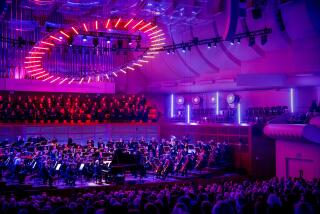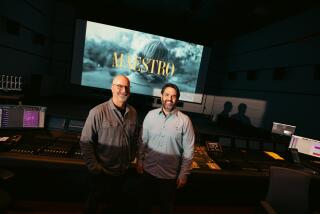Review: At Ace Hotel, new live score makes 1922 ‘Nosferatu’ a not-so-silent movie
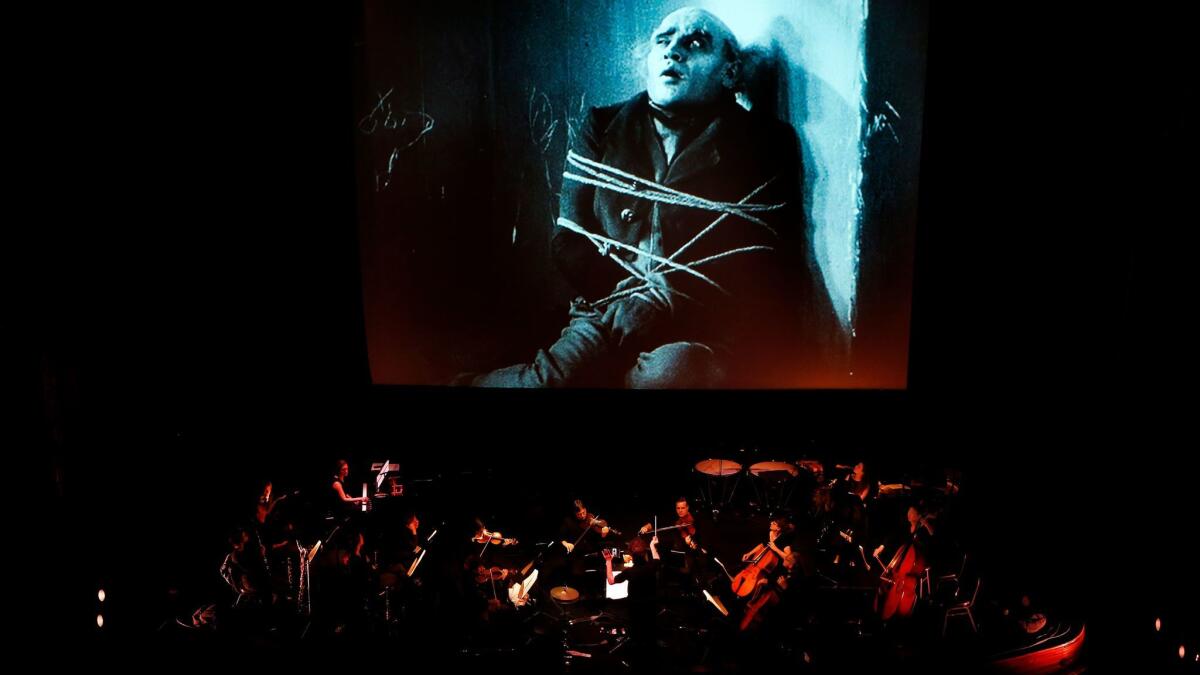
Last Halloween, L.A. Opera presented “Dracula” with Philip Glass’ score at the Theatre at Ace Hotel, with the composer and the Kronos Quartet playing live behind the 1931 film. It was a sold-out holiday hit.
Inevitably, the question arose: What to do for an encore?
How about another “Dracula” film with live music, but this time played to the earlier 1922 F.W. Murnau expressionist work “Nosferatu”? And not incidentally, how about making this an opportunity to show off the young, talented composer-conductor-pianist Matthew Aucoin, beginning his three-year term as L.A. Opera’s artist-in-residence?
So it happened Saturday night, again part of L.A. Opera’s Off Grand initiative for nonmainstage programming. With the ornate interior of the Ace lobby dimly lighted and the outpouring of Halloween-costumed folk in the audience, it was haunted house time again at the 1927 movie palace, with a loud party following the performance.
SIGN UP for the free Essential Arts & Culture newsletter »
But before we go any further, a little background: “Nosferatu” was an unauthorized attempt to make a film based on Bram Stoker’s “Dracula” story. The Stoker estate sued, and all prints were ordered destroyed. A few survived anyway.
Hans Erdmann wrote a “Nosferatu” score for live orchestra, but most of it was lost. Subsequent attempts to re-score the film include a 1979 Ojai Festival performance, for which William Malloch and Lukas Foss got the idea to play Schoenberg’s creepy, 12-tone “Accompaniment to a Cinematographic Scene” underneath a clip from “Nosferatu.” That worked uncannily well at the time.
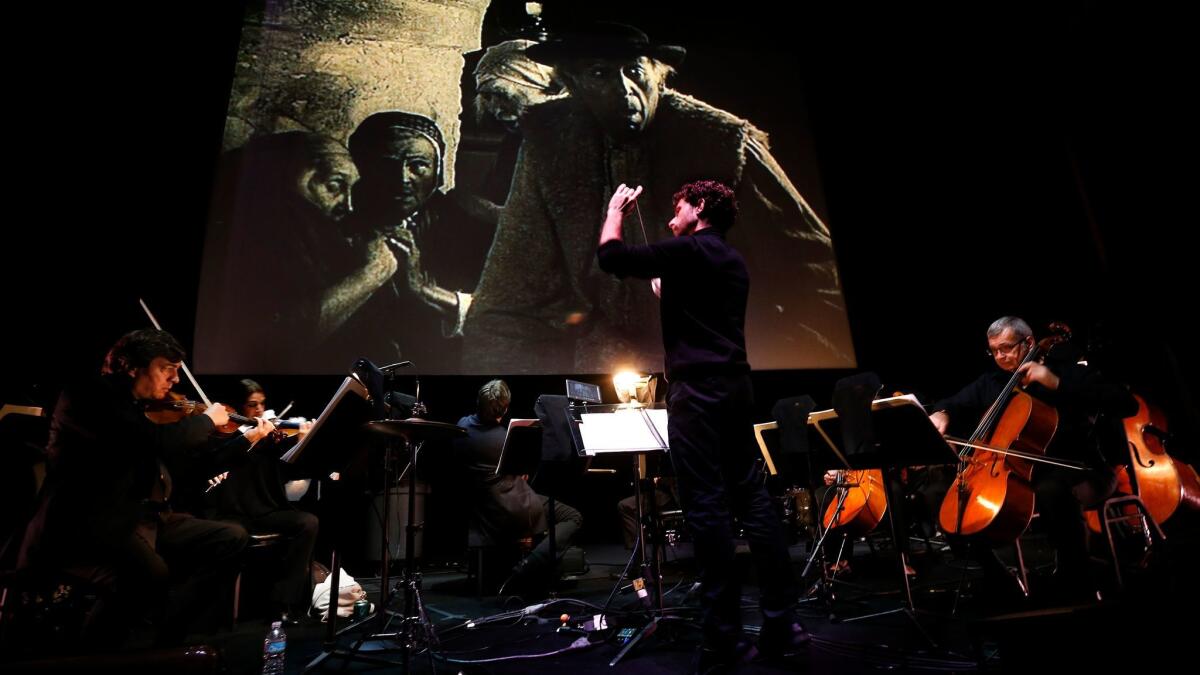
Aucoin’s rescoring of “Nosferatu” turned out to be a collage of this and that. Various bits and snatches from the German tradition were juxtaposed with Aucoin’s own underscoring and solo improvisations on the piano.
Passages of Schubert, Weber, Wagner, Zemlinsky and, yes, Schoenberg (“Pierrot Lunaire,” “Verklärte Nacht”), flew by, superbly played by a 14-member brigade from the L.A. Opera Orchestra seated in front of and below the screen, beautifully sung by soprano Liv Redpath in spots, and projected clearly in the room.
The most obvious correlation between score and film came at the end. As Count Orlok (Dracula) vanishes into the sunlight and Ellen dies, Aucoin was busy conducting the “Liebestod” from Wagner’s “Tristan und Isolde,” with the climax aimed at exactly the right point.
It was a tribute to Aucoin’s facility that his own pastiches often fit seamlessly within the context of his classical ancestors, while other passages sparingly employed avant-garde techniques to suggest horror. Aucoin’s improvs were for the most part dignified, abstract, sometimes impressionistic rambles, at one point taking off on “Verklärte Nacht.” He’s got a bundle of talent, for sure.
However, to call this “Nosferatu” a “Symphony of Horror” — as the program leaflet proclaims — is to misread what this elegantly played score sounded like and what this film, and Halloween itself, now means in the 21st century. Where once “Nosferatu” was meant to create a gloomy, genuinely scary atmosphere, this audience usually hooted and laughed whenever the silent-movie captions were displayed on the screen. Count Orlok’s face resembles that of former New York Mayor Rudy Giuliani, a comparison that has been rocketing around the Internet for some time now, triggering reactions unintended by the creators.
With irony being everything these days, whatever power “Nosferatu” once had has been neutered. Not even Schoenberg can bring it back.
------------
L.A. Opera Off Grand: “Nosferatu”
Where: The Theatre at Ace Hotel, 929 S. Broadway, L.A.
When: 8 p.m. Monday
Tickets: Sold out
Information: (213) 972-8001 or www.laopera.org
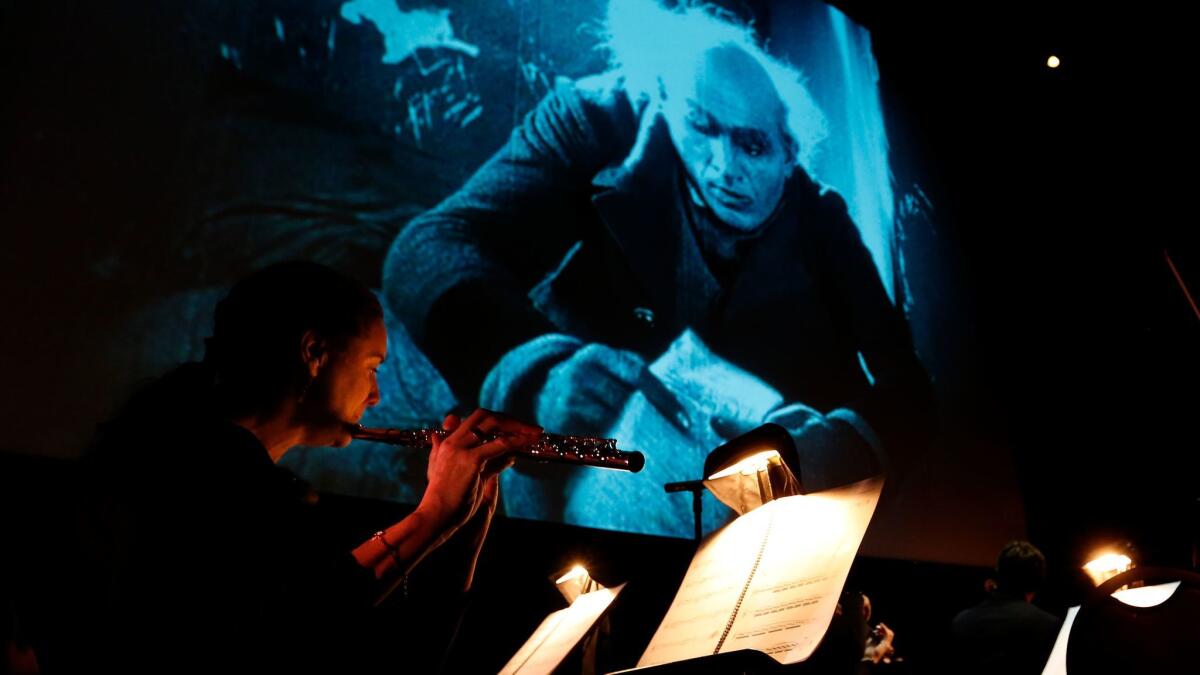
Follow The Times’ arts team @culturemonster.
ALSO
Hilary Hahn and Robert Levin, solo and together at Disney Hall
Chicago-based Dal Niente pops up in new L.A. music series called Poolhouse
Mahler lives! Dudamel gives his most impressive performance yet with L.A. Phil
More to Read
The biggest entertainment stories
Get our big stories about Hollywood, film, television, music, arts, culture and more right in your inbox as soon as they publish.
You may occasionally receive promotional content from the Los Angeles Times.
